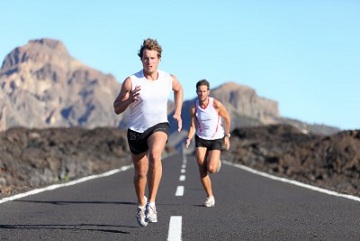
Other sports take safety precautions, but in ultramarathons, we have death-avoiding precautions baked into the enterprise. Most ultras are dotted with aid stations, where runners are tracked, sometimes weighed, and provided with snacks, shade, and medical checkups.
According to some, marathons and triathalons are the stuff of common folk. The real deal is the ultramarathon. And author Scott Jurek, profiled in the runaway bestseller Born to Run, has been a dominant force in the grueling and growing sport of ultrarunning. He's won races we've never heard of, like the Western States Endurance Run, a 100-mile traverse over the old Gold Rush trails of the California Sierra Nevada, which he won seven years in a row. Or the Badwater Ultramarathon, a 135-mile “jaunt” through Death Valley, which he won twice. Here's a glimpse into what it's like to be him, from his new book Eat & Run: My Unlikely Journey to Ultramarathon Greatness. In stores now.
For more information about Scott, check out http://www.scottjurek.com.
Ultrarunners take off at sunrise and continue through sunset, moonrise, and another sunrise, sunset, and moonrise. Sometimes we stumble from exhaustion and double over with pain, while other times we effortlessly float over rocky trails and hammer up a 3,000-foot climb after accessing an unknown source of strength. We run with bruised bones and scraped skin. It’s a hard, simple calculus: Run until you can’t run anymore. Then run some more. Find a new source of energy and will. Then run even faster.
Other sports take safety precautions, but in ultramarathons, we have death-avoiding precautions baked into the enterprise. Most ultras are dotted with aid stations, where runners are tracked, sometimes weighed, and provided with snacks, shade, and medical checkups. The majority of races also include pacers, who are allowed to accompany runners in latter sections of the course (but only for advice and to keep them from getting lost, not for carrying food or water). Ultrarunners can — much of the time — bring support crews, men and women who provide food, water, updates on competitors, and reassurance that you can, in fact, continue when you are sure you will collapse.
Nearly all ultras are run continuously, meaning that there is no point at which the clock stops and everyone gets to retire for a large plate of pasta and a well-deserved night’s sleep, like competitors in the Tour de France do. That’s part of the challenge and appeal of the event. You keep going in situations where most people stop. You keep running while other people rest.
But that was my problem — it was other people who stopped to rest. Not me. But now it was me. I simply couldn’t go on.
My friend and support crew member Rick was telling me he knew I could do it. He was mistaken. What had I done wrong? Was it my training and lack of recovery? Was it my race schedule? Had my mental approach been wrong? Was it what I had been eating? Was I thinking too much?
Ultramarathons give you plenty of time to think — that is, when you’re not watching out for mountain lions, avoiding sheer drops, or responding to grinning rocks and gibbering trees (which your mind can’t believe are mere phantasms). Stopping in an ultra, quitting, gives you even more time to ponder. But perhaps I wanted time to stop. Maybe I was meant to lie here on my back in the desert to question why I was running through an oven. Why was I subjecting myself to this torture?
I started running for reasons I had only just begun to understand. As a child, I ran in the woods and around my house for fun. As a teen, I ran to get my body in better shape. Later, I ran to find peace. I ran, and kept running, because I had learned that once you started something you didn’t quit, because in life, much like in an ultramarathon, you have to keep pressing forward.
Eventually I ran because I turned into a runner, and my sport brought me physical pleasure and spirited me away from debt and disease, from the niggling worries of everyday existence.
I ran because I grew to love other runners. I ran because I loved challenges and because there is no better feeling than arriving at the finish line or completing a difficult training run. And because, as an accomplished runner, I could tell others how rewarding it was to live healthily, to move my body every day, to get through difficulties, to eat with consciousness, that what mattered wasn’t how much money you made or where you lived, it was how you lived. I ran because overcoming the difficulties of an ultramarathon reminded me that I could overcome the difficulties of life, that overcoming difficulties was life.

No comments:
Post a Comment